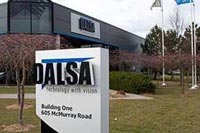KINGSTON, ONTARIO, August 13, 2007 – CMC Microsystems today announced that researchers at more than 40 Canadian universities across the country will have access to new microsystems integration capability through DALSA Corporation's semiconductor wafer foundry located in Bromont, Québec. This capability will enable graduate students and faculty members to develop industry-calibre prototypes that combine different technologies, and increase the commercial potential of Canadian-designed microsystems for products that are portable, compact and consume little power. These technologies have applications in diverse industrial sectors from life sciences to environment, energy, aerospace, automotive and information and communication technologies. This new service is also available for industrial customers.
Over 2,900 university researchers supported by CMC can now access a new fabrication service provided in partnership with DALSA that allows combination or integration of two established microsystems technologies—MEMS and microelectronics, including High Voltage access (300V)—on a single, tiny chip. These integrated devices are more versatile and consume less power than traditional systems, and create new opportunities to increase the safety of automobiles, improve patient monitoring, and enhance entertainment and other consumer electronics.
This post-processing fabrication service builds on the existing partnership between CMC and DALSA, a world leader in digital imaging components and specialized semiconductor manufacturing.
"A key element of CMC's strategy is enabling researchers and developers to combine individual technologies for the creation of systems that can be designed, built, tested and then moved out of the university environment to be successfully marketed," says Dr. Ian McWalter, President and CEO, CMC Microsystems. "This new service expands the portfolio of technologies available through CMC, and enables Canadian researchers from electrical and mechanical engineering, physics, chemistry and the life sciences as well as other scientific disciplines to combine critical technologies in a single, small-scale prototype device. This capability is required to build multi-faceted microsystems with more powerful features, and to develop the technological expertise that will increase the competitiveness of Canadian industry."
"This post-processing fabrication service provides university researchers with proof-of-concept prototypes required to investigate basic science and technology while at the same time enabling future commercial spin-off opportunities," says Ralf Brooks, President, DALSA Semiconductor. "Our partnership with CMC allows university researchers to gain access to leading-edge technologies offered by DALSA, ultimately increasing the visibility of our specialized MEMS and CMOS-based, integrated MEMS semiconductor technologies in university labs across the country. This helps to create future opportunities for our company as these highly qualified people move to industry. These engineers and scientists are the future employees, business partners and customers of DALSA."
Dr. Rafaat Mansour, Professor and COM DEV Industrial Research Chair, Electrical and Computer Engineering, University of Waterloo, will be among the first university researchers to benefit from access to this new service. "Most Canadian researchers would not be able to access this type of technology without the partnership that exists between CMC and DALSA," says Dr. Mansour. "I have several students who will use this post-processing service for creating MEMS-based communications devices that will, for example, improve the quality of cell phone signals."
Dr. Yongjun Lai, Assistant Professor, Mechanical and Materials Engineering, Queen's University, describes some of the benefits of this new service for university researchers: "In the last several years, there has been a tremendous increase in the number of Canadian scientists and engineers who are conducting MEMS research," says Dr. Lai. "This service will enable researchers to drive and test MEMS systems in a way that was not possible before. Previous solutions involved using wires to attach electrical components to MEMS devices, resulting in a system that was large and inaccurate. This new service will allow me to incorporate electronic components directly with my integrated MEMS system on the same compact, portable chip. I can then obtain dynamic measurements in a more efficient way."
The MEMS post-processing process is applied to conventional 0.8 micron High Voltage CMOS/DMOS wafers to create structural materials from different interconnect layer combinations, using a single mask, two etches process. This will result in fine lines and gaps released microstructures which can sense or be actuated using the wide voltage range provided by the high voltage CMOS process (from 3.3V to 300V).
_______________________________________________________________________
About CMC Microsystems:
CMC Microsystems builds partnerships among government, industry and universities to enable and accelerate Canada's global competitiveness in microsystems. As Canada's leader in the provision of national infrastructure for microsystems research and technology development in universities, CMC provides leading-edge tools and technologies for world-class research leading to innovation and the commercialization of microsystems. CMC's membership includes 42 universities, one college, and 27 industrial organizations. More information is available at www.cmc.ca
For more information, please contact:
Sonya Shorey,
Director of Marketing Communications
CMC Microsystems
Tel: 613.530.4698
Cell: 613.851.9416
[email protected] ______________________________________________________________________
About DALSA Semiconductor:
DALSA is an international leader in high performance digital imaging and semiconductors with more than 1000 employees world-wide. Established in 1980, the company designs, develops, manufactures, and markets digital imaging products and solutions, in addition to providing semiconductor products and services. DALSA's core competencies are in specialized integrated circuit and electronics technology, software, and highly engineered semiconductor wafer processing. Products and services include image sensor components (CCD and CMOS); electronic digital cameras; vision processors; image processing software; and semiconductor wafer foundry services for use in MEMS, high-voltage semiconductors, image sensors and mixed-signal CMOS chips. DALSA is listed on the Toronto Stock Exchange under the symbol "DSA" and has its corporate offices in Waterloo, Ontario, Canada.
For more information, please contact:
Patrick Myles
Director, Corporate Communications
DALSA Corporation
Tel: 519.886.6001 Ext. 2177
[email protected]
